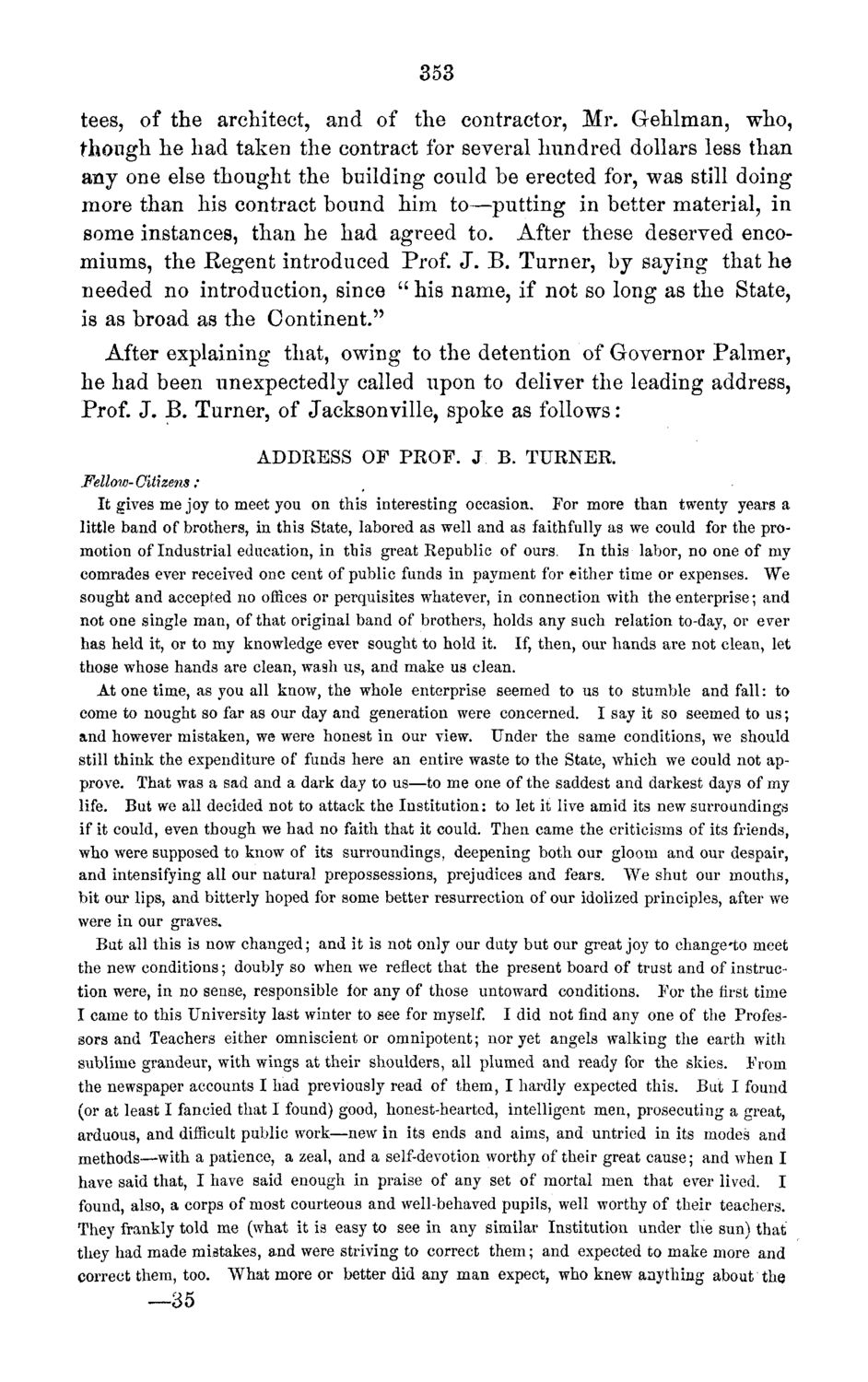| |
| |
Caption: Board of Trustees Minutes - 1871
This is a reduced-resolution page image for fast online browsing.

EXTRACTED TEXT FROM PAGE:
353 tees, of the architect, and of the contractor, Mr. Gehlman, who, though he had taken the contract for several hundred dollars less than any one else thought the building could be erected for, was still doing more than his contract bound him to—putting in better material, in some instances, than he had agreed to. After these deserved encomiums, the Regent introduced Prof. J . B. Turner, by saying that he needed no introduction, since " his name, if not so long as the State, is as broad as the Continent." After explaining that, owing to the detention of Governor Palmer, he had been unexpectedly called upon to deliver the leading address, Prof. J. B. Turner, of Jacksonville, spoke as follows: ADDRESS OF PROF. J B. TURNER. Fellow-Citizens: It gives me joy to meet you on this interesting occasion. For more than twenty years a little band of brothers, in this State, labored as well and as faithfully as we could for the promotion of Industrial education, in this great Republic of ours. In this labor, no one of my comrades ever received one cent of public funds in payment for either time or expenses. We sought and accepted no offices or perquisites whatever, in connection with the enterprise; and not one single man, of that original band of brothers, holds any such relation to-day, or ever has held it, or to my knowledge ever sought to hold it. If, then, our hands are not clean, let those whose hands are clean, wash us, and make us clean. At one time, as you all know, the whole enterprise seemed to us to stumble and fall: to come to nought so far as our day and generation were concerned. I say it so seemed to us; and however mistaken, we were honest in our view. Under the same conditions, we should still think the expenditure of funds here an entire waste to the State, which we could not approve. That was a sad and a dark day to us—to me one of the saddest and darkest days of my life. But we all decided not to attack the Institution: to let it live amid its new surroundings if it could, even though we had no faith that it could. Then came the criticisms of its friends, who were supposed to know of its surroundings, deepening both our gloom and our despair, and intensifying all our natural prepossessions, prejudices and fears. We shut our mouths, bit our lips, and bitterly hoped for some better resurrection of our idolized principles, after we were in our graves. But all this is now changed; and it is not only our duty but our great joy to changcto meet the new conditions; doubly so when we reflect that the present board of trust and of instruction were, in no sense, responsible for any of those untoward conditions. For the first time I came to this University last winter to see for myself. I did not find any one of the Professors and Teachers either omniscient or omnipotent; nor yet angels walking the earth with sublime grandeur, with wings at their shoulders, all plumed and ready for the skies. From the newspaper accounts I had previously read of them, I hardly expected this. But I found (or at least I fancied that I found) good, honest-hearted, intelligent men, prosecuting a great, arduous, and difficult public work—new in its ends and aims, and untried in its modes and methods—with a patience, a zeal, and a self-devotion worthy of their great cause; and when I have said that, I have said enough in praise of any set of mortal men that ever lived. I found, also, a corps of most courteous and well-behaved pupils, well worthy of their teachers. They frankly told me (what it is easy to see in any similar Institution under the sun) that they had made mistakes, and were striving to correct them; and expected to make more and correct them, too. What more or better did any man expect, who knew anything about the —35
| |